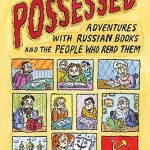 [Farrar, Straus and Giroux; 2010]
[Farrar, Straus and Giroux; 2010]
by Amanda Shubert
Elif Batuman’s The Possessed, a collection of essays about Russian novels and the author’s eight years studying them as a graduate student at Stanford, is a work of criticism suffused with the experience of youth, heady and unpredictable. It’s also a coming-of-age story about reading, and in particular, the head-over-heels immersion in reading that only graduate school can purvey. Batuman pursues her theories about literature through readings of writers like Isaac Babel, Cervantes, Tolstoy, Chekhov and Dostoevsky, through a summer studying Uzbek poetry in Samarkand, but also through her own experiences. Her argument about the novel also constitutes her method in The Possessed:
From Cervantes onward. the method of the novel has typically been imitation: the characters try to resemble the characters in the books they find meaningful. But what if you tried something different—what if you tried study instead of imitation, and metonymy instead of metaphor?
Rilke wrote that criticism must proceed from love, and if The Possessed represents an honest, devoted effort to fulfill that injunction, Batuman’s love comes by way of a mischievous sense for the ridiculous in the day-to-day that would have left the German poet completely flummoxed. The front and back cover for The Possessed, designed and illustrated by the New Yorker cartoonist Roz Chast, herald Batuman’s quirky, loving and at times devastatingly funny characterizations, like in this dialogue between Nathalie Babel, the septuagenarian daughter of Isaac Babel who speaks almost exclusively in all-caps, and the Babel scholar Janet Lind at a Babel conference at Stanford:
“JANET,” Nathalie said finally, in her fathomless voice. “IT IS TRUE THAT YOU DESPISE ME?”
Janet Lind turned to her calmly. “I beg your pardon?”
“IS IT TRUE THAT YOU DESPISE ME?”
“I can’t imagine what makes you say that.”
“I say it because I would like to know if it is TRUE THAT YOU DESPISE ME.”
“That is an extremely odd question. What gives you an idea like that?”
“I just think you were told that I’m a NASTY OLD WITCH.”
“This is really extremely odd. Did someone say something to you?” Lind frowned slightly. “You and I have barely had any interactions.”
Batuman’s effortless feeling for Russian idioms – this could be a scene from one of Chekhov’s comic one acts – is an example of what makes The Possessed so deeply satisfying to those of us already familiar with the literature. Her caricatures double as homage, and even the most absurd eventually reveal themselves as another expression of her integrity, her erudition and generosity. (Batuman is never smug or self-congratulatory.) At the same time, this comic quality provides a compelling entry point to unfamiliar works and writers.
Batuman’s stories, like her voice, mix absurdism and bravado with an unrestrained emotional honesty. The essay “Who Killed Tolstoy?” narrates Batuman’s experience at a Tolstoy conference held in Tolstoy’s legendary home at Yasnaya Polyana, beginning with an attempt to secure extra funding with a research proposal for a forensic investigation of Tolstoy’s death (“You are certainly my most entertaining student,’” Batuman’s adviser tells her when she presents her theory. “Tolstoy—murdered! Ha! Ha! Ha!). But it ends, unpredictably, deftly, as an elegy for all that research will never capture. “Dr. Chekhov,” she asks, “loyal custodian of the human body, you who could look in the ear of an idle man and see an entire universe—where are you now?”
The most uneven work in The Possessed is “Summer in Samarkand,” the long personal essay broken into three sections that interpolate the book’s other pieces, about a graduate school summer spent on a research grant in Uzbekistan learning the Uzbek language and its folkloric tradition of poetry. Though the episode represents the thrust of her coming-of-age narrative, probably no one, not even Batuman, can make Uzbek poetry scintillating to American readers for a hundred pages. Yet she handles those sections with such humor and subtlety, that characteristic candor and wit, that even if they don’t have that revelatory quality of her chapters on Tolstoy or Dostoevsky, they are rarely tiresome.
This is a remarkable work from a young critic at the burgeoning of her career, and yet the tensions she opens with – between the creative writer and the scholar, life lived within and without the walls of the academy – are bound to continue to manifest as she negotiates the strictures and the politics of the life of the mind. Academia does not always tolerate this kind of take-no-prisoners enthusiasm for experimentation, while the mainstream publishing world does not always tolerate Batuman’s level of scholastic rigor. And yet this is exactly what we need: more books that don’t force us to choose between enthusiasm and rigor, the ridiculous and the sublime, stories and arguments, the personal and the literary. If the theories we use to read novels don’t also help us read our lives, then we’ve missed the point entirely.
This post may contain affiliate links.








